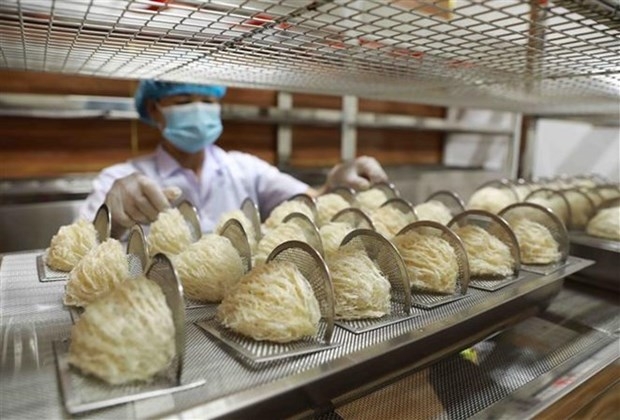Efforts to export bird’s nests to China via official channels
Minister of Agriculture and Rural Development Le Minh Hoan has signed the Protocol on requirements for quarantine, inspection and veterinary hygiene for bird’s nests of Vietnam to be exported to China after the document was inked by the General Department of Customs of China.

According to the official, since 2019, the Ministry of Agriculture and Rural Development (MARD) has negotiated with the Chinese side for the official export of this product to the neighbouring country.
China is the world's largest market for bird's nests, accounting for more than 80% of the global market share. When the market is activated, the bird's nest industry of Vietnam will be restructured, creating higher added value, helping improving the income and profits for bird nest farmers and processing enterprises, the minister said.
Vietnam has many favourable conditions for swiftlet farming with its long coastline, many islands, bays and lagoons. The quality of Vietnam bird's nest products is also considered superior to those in other countries in the region and favoured by Chinese consumers.
Additionally, the country also shares a long border with China, which is very convenient for trading and transporting goods to the Chinese market, thus creating a more competitive advantage for Vietnamese products.
In the past five years, swiftlet farming has developed strongly in 42 provinces and cities nationwide, mainly in the South-central and Central Highlands regions, the ministry said.
Currently, more than 22,000 swiftlet houses have been installed across the nation with an annual output of about 120 tonnes worth over US$500 million.
Immediately after signing the protocol, the MARD requested relevant units and agencies to fully inform industry associations, bird’s nest farming sites and farmers about regulations on traceability and food safety under the protocol.
The ministry also requested bird’s nest processing enterprises study and fully comply with the requirements set by the Chinese side on the management of swiftlet-raising establishments and processing facilities to ensure disease control, food safety and traceability.
Associations and businesses need to closely coordinate with specialised agencies and localities to urgently develop and organise a surveillance programme for bird flu and Newcastle disease on swiftlets, and a food safety monitoring plan for bird's nest products.
The MARD will have a strategy and plan to develop the Vietnamese bird's nest industry responsibly and sustainably, preserving the Vietnamese bird's nest brand and meeting the requirements of China, as well as other potential markets, Hoan said.
